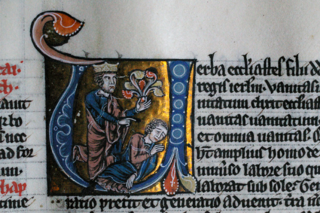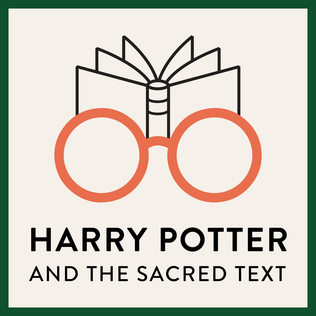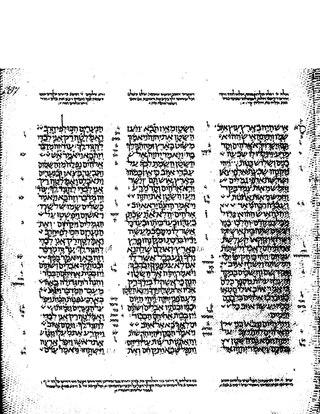The Book of Proverbs is a book in the third section of the Hebrew Bible and a book of the Christian Old Testament. When translated into Greek and Latin, the title took on different forms: in the Greek Septuagint (LXX) it became Παροιμίαι ; in the Latin Vulgate the title was Proverbia, from which the English name is derived.

Humanists UK, known from 1967 until May 2017 as the British Humanist Association (BHA), is a charitable organisation which promotes secular humanism and aims to represent "people who seek to live good lives without religious or superstitious beliefs" in the United Kingdom by campaigning on issues relating to humanism, secularism, and human rights. It seeks to act as a representative body for non-religious people in the UK.
Bibliomancy is the use of books in divination. The use of sacred books for 'magical medicine', for removing negative entities, or for divination is widespread in many religions of the world.

Anthony Clifford Grayling is a British philosopher and author. He was born in Northern Rhodesia and spent most of his childhood there and in Nyasaland. In 2011 he founded and became the first Master of New College of the Humanities, an independent undergraduate college in London. Until June 2011, he was Professor of Philosophy at Birkbeck, University of London, where he taught from 1991. He is also a supernumerary fellow of St Anne's College, Oxford, where he formerly taught.

Proverbs 31 is the 31st and final chapter of the Book of Proverbs in the Hebrew Bible or the Old Testament of the Christian Bible. Verses 1 to 9 present the advice which King Lemuel's mother gave to him, about how a just king should reign. The remaining verses detail the attributes of a good wife or an ideal woman. The latter section is also known as Eshet Ḥayil.

Humanism is a democratic and ethical life stance, which affirms that human beings have the right and responsibility to give meaning and shape to their own lives.

Illuminated World Lidingö, is a Swedish publishing group best known for releasing Bible Illuminated: The Book. Composed of business executives and headed by Dag Söderberg and Jan Carlzon, the group was formed to foster the Book’s production. Illuminated World has partnerships with both the American Bible Society and Midpoint Trade Books.

The God Argument: The Case against Religion and for Humanism is a 2013 book by the English philosopher and humanist, A. C. Grayling, in which he counters the arguments for the existence of God, and puts forward humanism as an alternative to religion.
The secular movement refers to a social and political trend in the United States, beginning in the early years of the 20th century, with the founding of the American Association for the Advancement of Atheism in 1925 and the American Humanist Association in 1941, in which atheists, agnostics, secular humanists, freethinkers, and other nonreligious and nontheistic Americans have grown in both numbers and visibility. There has been a sharp increase in the number of Americans who identify as religiously unaffiliated, from under 10 percent in the 1990s to 20 percent in 2013. The trend is especially pronounced among young people, with about one in three Americans younger than 30 identifying as religiously unaffiliated, a figure that has nearly tripled since the 1990s.

Ecclesiastes 1 is the first chapter of the Book of Ecclesiastes in the Hebrew Bible or the Old Testament of the Christian Bible. The book contains philosophical speeches by a character called Qoheleth composed probably between the 5th and 2nd centuries BC. Peshitta, Targum, and Talmud, as well as most Jewish and Christian readership, attribute the authorship of the book to King Solomon. This chapter contains the title of the book, the exposition of some fundamental observations and the problem of life, especially the failure of wisdom.

Proverbs 1 is the first chapter of the Book of Proverbs in the Hebrew Bible or the Old Testament of the Christian Bible. The book is a compilation of several wisdom literature collections, with the heading in 1:1 may be intended to regard Solomon as the traditional author of the whole book, but the dates of the individual collections are difficult to determine, and the book probably obtained its final shape in the post-exilic period. This chapter is a part of the first collection of the book.

Harry Potter and the Sacred Text is an audio podcast founded by Vanessa Zoltan, Casper Ter Kuile, and Ariana Nedelman, and hosted by Vanessa Zoltan and Matt Potts, in which the Harry Potter books are read as a sacred text. Each episode, the characters and context of one chapter in the Harry Potter series are explored through a different central theme like 'vulnerability', 'betrayal', or 'friendship'. The podcast, which charted #2 on the US iTunes Charts a few months after its inception in 2016, has been described as "Bible studies for J.K. Rowling fans".

Ecclesiastes 7 is the seventh chapter of the Book of Ecclesiastes in the Hebrew Bible or the Old Testament of the Christian Bible. The book contains philosophical speeches by a character called '(the) Qoheleth', composed probably between the 5th and 2nd centuries BC. Peshitta, Targum, and Talmud attribute the authorship of the book to King Solomon.

Proverbs 3 is the third chapter of the Book of Proverbs in the Hebrew Bible or the Old Testament of the Christian Bible. The book is a compilation of several wisdom literature collections, with the heading in 1:1 may be intended to regard Solomon as the traditional author of the whole book, but the dates of the individual collections are difficult to determine, and the book probably obtained its final shape in the post-exilic period. This chapter is a part of the first collection of the book.

Proverbs 9 is the ninth chapter of the Book of Proverbs in the Hebrew Bible or the Old Testament of the Christian Bible. The book is a compilation of several wisdom literature collections, with the heading in 1:1 may be intended to regard Solomon as the traditional author of the whole book, but the dates of the individual collections are difficult to determine, and the book probably obtained its final shape in the post-exilic period. This chapter is a part of the first collection of the book.

Proverbs 2 is the second chapter of the Book of Proverbs in the Hebrew Bible or the Old Testament of the Christian Bible. The book is a compilation of several wisdom literature collections, with the heading in 1:1 may be intended to regard Solomon as the traditional author of the whole book, but the dates of the individual collections are difficult to determine, and the book probably obtained its final shape in the post-exilic period. This chapter is a part of the first collection of the book.

Proverbs 4 is the fourth chapter of the Book of Proverbs in the Hebrew Bible or the Old Testament of the Christian Bible. The book is a compilation of several wisdom literature collections, with the heading in 1:1 may be intended to regard Solomon as the traditional author of the whole book, but the dates of the individual collections are difficult to determine, and the book probably obtained its final shape in the post-exilic period. This chapter is a part of the first collection of the book. The Jerusalem Bible entitles this chapter, "On choosing wisdom".

Proverbs 8 is the eighth chapter of the Book of Proverbs in the Hebrew Bible or the Old Testament of the Christian Bible. The book is a compilation of several wisdom literature collections, with the heading in 1:1 may be intended to regard Solomon as the traditional author of the whole book, but the dates of the individual collections are difficult to determine, and the book probably obtained its final shape in the post-exilic period. This chapter is a part of the first collection of the book.

Proverbs 28 is the 28th chapter of the Book of Proverbs in the Hebrew Bible or the Old Testament of the Christian Bible. The book is a compilation of several wisdom literature collections, with the heading in 1:1 may be intended to regard Solomon as the traditional author of the whole book, but the dates of the individual collections are difficult to determine, and the book probably obtained its final shape in the post-exilic period. This chapter is the last part of the fifth collection of the book, so-called "the Second Solomonic Collection."

Job 28 is the 28th chapter of the Book of Job in the Hebrew Bible or the Old Testament of the Christian Bible. The book is anonymous; most scholars believe it was written around 6th century BCE. This chapter records the speech of Job, which belongs to the Dialogue section of the book, comprising Job 3:1–31:40.










